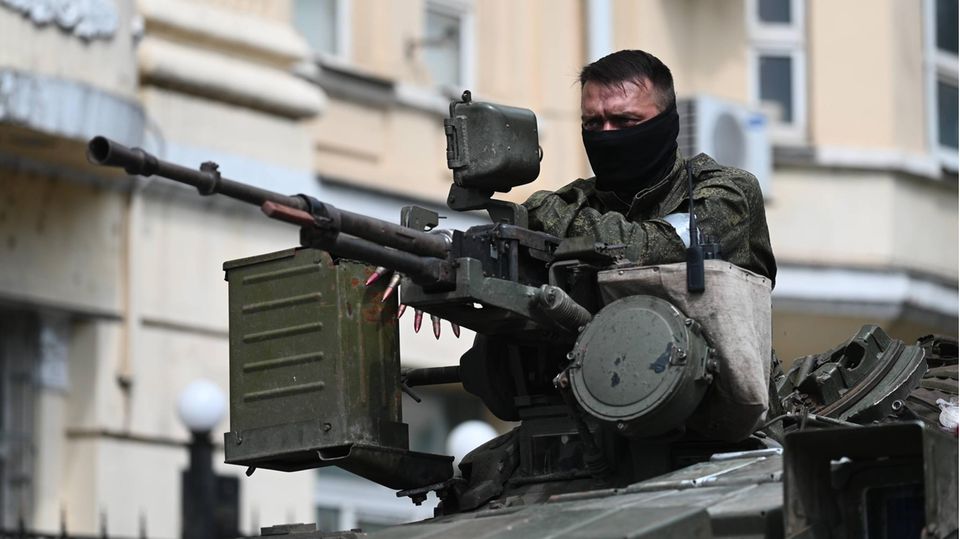rebellion in Russia
Prigozhin announces the withdrawal of his fighters – and remains unpunished
Soldiers of the Wagner Group in Rostov
© AP/dpa
For a day, Yevgeny Prigozhin held the world in suspense with his march on Moscow. In the evening he announced his withdrawal and turned away. According to the Kremlin, he does not have to fear criminal proceedings.
The Wagner mercenary force challenged the Russian leadership on Saturday with a march on Moscow – but eventually turned back halfway. His fighters returned to their camps to avoid a bloodbath in Russia, Wagner boss Yevgeny Prigozhin surprisingly announced in the evening.
According to information from Minsk, the Belarusian head of state Alexander Lukashenko negotiated the end of the uprising with Prigozhin. Kremlin boss Vladimir Putin had previously warned of a “civil war”. According to the Kremlin, the criminal case against the boss Prigozhin will be dropped. Prigozhin himself will go to Belarus, Kremlin spokesman Dmitry Peskov said on Saturday, according to the Russian news agency Interfax.
His fighters returned to their camps “as planned,” Prigozhin said in a voice message distributed by his press service on Saturday evening. He doesn’t want to “spill Russian blood”. The Belarusian presidential office said Lukashenko had negotiated an end to troop movements and “further steps to de-escalate tensions” with the Russian mercenary leader.
Lukashenko, in consultation with Putin, had started negotiations with the Wagner boss that lasted all day. According to the information, the solution also includes security guarantees for the Wagner fighters.
Prigozhin took Rostov “without a single shot”.
On Friday evening, the long-simmering power struggle between Prigozhin and the Russian military leadership escalated. Wagner fighters invaded Russia from Ukraine with the aim of overthrowing the military leadership in Moscow. In the morning they captured the important army headquarters in the southern Russian city of Rostov – and “without a single shot,” Prigozhin said. The quarter is an important location for the Russian offensive in Ukraine.
According to the regional government, the mercenaries later advanced to the Russian region of Lipetsk, around 400 kilometers south of Moscow.
Security measures have therefore been tightened in Moscow and several Russian regions. “The situation is difficult,” said the mayor of the capital, Sergei Sobyanin, and called on residents to limit their movements as much as possible. As a precaution, he declared next Monday to be a day off.
Erdogan assures Putin full support
In a television speech, Putin called the rebellious Wagner mercenaries “traitors” who would “inevitably be punished.” The Kremlin chief warned that the uprising was a “deadly threat” to Russia. He called on the Russians to “unite” and stressed that he would not allow a civil war in Russia.
The Kremlin chief was backed by several allies: Chechen leader Ramzan Kadyrov says he has sent his troops to the “areas of tension” in Russia. Belarus condemned the armed rebellion as a “gift to the West”.
According to the Kremlin, Turkish President Recep Tayyip Erdogan also promised Putin his “full support” in a telephone call.
Meanwhile, Moscow warned the West not to profit from the situation in Russia. Any attempts by western countries to achieve their “anti-Russian goals” would be “void,” the Russian Foreign Ministry said.
“Unique opportunity” for Kyiv
The Ukrainian Deputy Defense Minister Hanna Maljar spoke of a “unique opportunity” for Kiev with regard to the uprising. She also informed about new Ukrainian offensives in the eastern region of Donbass, where “progress is being made in all directions”. The supreme commander of the Ukrainian armed forces, Valery Zalushny, assured that the Ukrainian counter-offensive was going “according to plan”.
Ukrainian President Volodymyr Zelenskyy said in his evening video message that the uprising showed that the Russian leadership had “no control” over the situation. Putin is “obviously very scared” and is probably hiding somewhere. Rumors also circulated in online networks that Putin had left Moscow because of the uprising. However, his spokesman assured that the President would continue to work in the Kremlin.
Internationally, the escalation in Russia was received with concern. Latvia announced that it would strengthen border security and would not allow refugees from the chaos in Russia to enter the country. US President Joe Biden spoke on the phone with Chancellor Olaf Scholz (SPD), French President Emmanuel Macron and British Prime Minister Rishi Sunak. According to the White House, they reiterated “their unwavering support for Ukraine”.
Prigozhin accused Russian Defense Minister Sergei Shoigu on Friday evening of ordering rocket attacks on his troops. He called on the Russians to join his 25,000 fighters. The Russian domestic secret service FSB then initiated criminal proceedings against him for “armed mutiny”.
It was initially unclear how Prigozhin’s uprising and his announcement of withdrawal would continue to have an effect. Dozens of citizens gathered in Rostov in the evening in front of the previously occupied military headquarters and, shouting “Wagner! Wagner!”, expressed their support for Prigozhin. The Wagner fighters nevertheless began to leave the military headquarters, an AFP reporter reported. The Lipetsk regional government lifted the restrictions imposed because of the Wagner rebellion.


